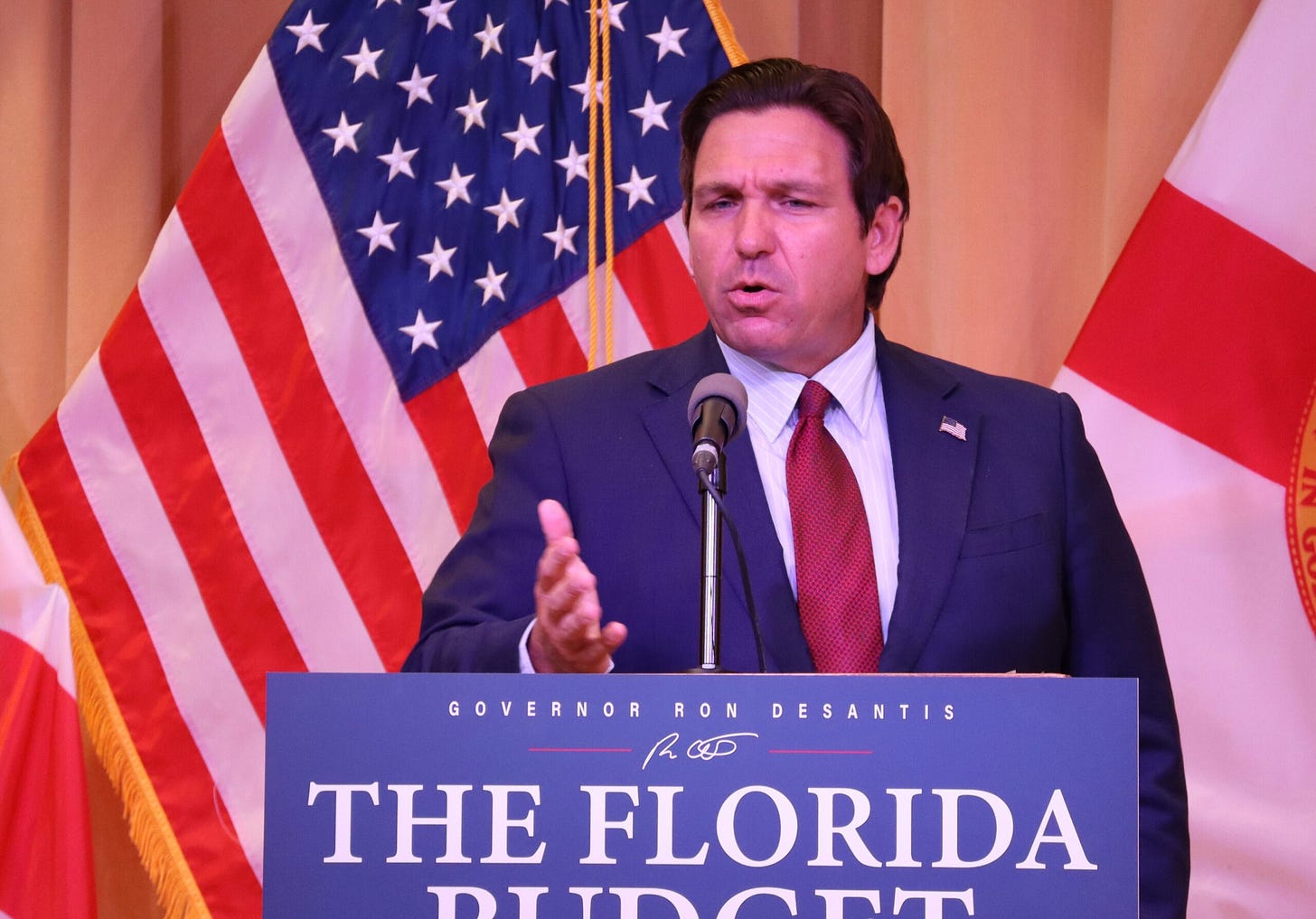Florida's 2026 State Budget: The Highlights
Governor Ron DeSantis signed the Florida's $115.1 billion state budget into law, touting it as $4 billion less than the budget approved last year.
Gov. Ron DeSantis signed a $115.1 billion state budget Monday for the 2025–2026 fiscal year, marking Florida’s second consecutive year of reduced state spending. The budget includes $567 million in line-item vetoes and emphasizes fiscal responsibility, debt reduction, education investment, and infrastructure upgrades. The now-approved budget ends a prolonged 105-day legislative session marked by internal GOP conflict over tax cuts, spending priorities, and fiscal tightening.
The finalized spending plan is approximately $4 billion less than the state's current adjusted budget and nearly $600 million less than the Legislature's proposal, a result of DeSantis's extensive use of his line-item veto power. The governor cut $567 million from local projects and programs, part of a broader $1.35 billion in total vetoes across appropriations bills. Emphasizing Florida's strong fiscal management, DeSantis stated, "This is the second year in a row the budget will spend less than the current year’s budget" during a press conference in The Villages.
The new budget and an associated tax cut package include a 2% raise for state workers, a 10% to 15% pay hike for state law enforcement, and $4 billion for private and religious school scholarships, a point of contention for Democrats advocating for increased public school funding. The spending plan will also deliver $1.3 billion annually in tax cuts for families and businesses by permanently eliminating the 2% business rent tax and delivering new and expanded consumer product sales tax breaks. The tighter budget comes as Florida navigates the cessation of federal coronavirus funding and broader economic uncertainties. While the budget prioritizes tax relief and debt reduction, it does not include property tax rebates or the significant state sales tax rate cut previously proposed by House Speaker Daniel Perez (R-Miami). The efforts to significantly reduce or eliminate property taxes are expected to return next year, including a possible constitutional amendment on the 2026 ballot.
Key Budget Figures:
$117.4 billion: Total FY 2025–26 budget after vetoes
$567 million: Vetoed from projects and programs across the state
$15.7 billion: Total state reserves
$429 million: Additional contribution to the Budget Stabilization Fund, reaching its legal limit
$4.9 billion: Total in Florida’s “Rainy Day” fund
$830 million: Funding to accelerate debt repayment
$250 million: Minimum annual debt repayment now required in perpetuity
$2 billion: Total tax relief, including repeal of the business rent tax
$428 million+: Sales tax holiday savings for Florida families
Education Highlights:
$15.9 billion: K–12 public school system funding
$9,130: Record per-pupil investment, up $143 from last year
$1.36 billion: Teacher and instructional personnel salary increases
$1.6 billion: Early childhood education funding
$7.4 million: Civics education initiatives
$637.7 million: Bright Futures scholarships
$1.8 billion: Florida College System
$3.9 billion: State University System
$161.5 million: Florida’s Historically Black Colleges and Universities
$675 million: Performance funding for colleges and universities
$726.9 million: Workforce education programs
$130 million: Nursing education support
Infrastructure and Economy:
$15.1 billion: Florida Department of Transportation funding
$13.7 billion: State transportation work program
$50 million: Job Growth Grant Fund
$80 million: VISIT FLORIDA marketing
$22 million: Rural Infrastructure Fund
$92.2 million: Small County Outreach Program
$163.8 million: State Housing Initiatives Partnership (SHIP)
$71.2 million: State Apartment Incentive Loan (SAIL)
$50 million: Hometown Heroes Housing Program
Law Enforcement and Military Support:
$49 million: Pay increases for 16,200 law enforcement officers
$20 million: Law Enforcement Recruitment Bonus Program
$3 million: FDLE grants for ICE-contracted jails
$1.9 million: Office of SecureFlorida (immigration compliance)
$446,220: Sex offender registry compliance support
$2 million: Defense Support Commission
$1.5 million: Military Base Protection Program
$3.3 million: FHP vehicle replacement
$2 million: Patrol dash camera installation
$1.8 million: Bulletproof shields for troopers
Environmental and Resiliency Investments:
$1.4 billion+: Everglades restoration and water quality
$830 million: Specific Everglades restoration projects, including:
$550 million: CERP
$64 million: EAA Reservoir
$50 million: Estuary discharge reductions
$81 million: Northern Everglades protection
$65 million: C-51 Reservoir
$20 million: Agricultural water restoration
$460 million: Targeted water quality improvements
$25 million: Indian River Lagoon projects
$10 million: Caloosahatchee River watershed improvements
$50 million: Springs restoration
$30 million: Algae bloom mitigation
$50 million: Alternative water supply projects
$34 million: State park infrastructure
$996 million: Conservation and acquisition programs
$260 million: Resilient Florida program
$209 million: Coastal defense and resiliency
$53 million: Beach nourishment
$127 million: Citrus industry support
$17.5 million: Apalachicola Bay and oyster reef restoration
$4 million: Forest replanting in rural areas
$33 million+: Wildfire suppression and equipment
$221 million: Contaminated site cleanups
Disaster Recovery and Mitigation:
$203.8 million: State match for federal disaster aid
$150 million: CDBG disaster recovery and mitigation funding
Health and Human Services:
$123.9 million: Behavioral health and mental health facility support
$194.8 million: Opioid recovery and treatment
$31.8 million: CORE Network expansion
$265.4 million: Total cancer research funding
$30 million: Pediatric cancer research incubator
$127.5 million: Casey DeSantis Cancer Research Program
$60 million: Cancer Innovation Fund
$78.7 million: Child welfare and prevention services
$23.8 million: Maternal and child health services
$29.5 million: Pregnancy support
$73.8 million: Alzheimer’s Disease Initiative
$126.5 million: Senior home care and community support
$20.8 million: State Veterans’ Nursing Homes improvements
$1 million: Veterans Dental Grant Program
$2 million: Veterans employment and entrepreneurship





